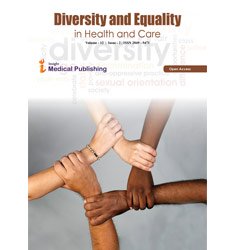Theme: Utilizing Healthy data for better Integrated care
TELEMEDICINE CONGRESS 2020
Conference series llc LTD proudly announces the “International Conference on Telemedicine and Digital Health ” which will be held during September 22-23,2020 at Singapore. The theme of the conference is “Utilizing Healthy data for better Integrated care”. This conference will bring together Medical Informatics Researchers and practitioners from more than 40 nations to share their knowledge, experience, and expertise through a series of Key Notes, Plenary Talks, Workshops, Symposiums, and Exhibitions.
Telemedicine Congress 2020 mainly focuses on Telemedicine, eHealth & Health Informatics, It is now being extensively used in medical and healthcare sectors; Hence telemedicine and medical informatics are expected to grow at a high rate in coming years, which is expected to boost the growth of the medical care technology. In Telemedicine, one transfers the expertise, not the patient. The term telehealth can refer to clinical and non-clinical_services such as medical education and clinical research and telemedicine refer only to the provision of medical services.
Singapore officially the Republic of Singapore, is a sovereign city-state and island country in Southeast Asia. It lies off the southern tip of the Malay Peninsula and is 137 kilometres (85 mi) north of the equator. Singapore is separated from Peninsular Malaysia by the Straits of Johor to the north and from Indonesia's Riau Islands by the Singapore Strait to the south. The country is highly urbanized, and little of the original vegetation remains. Singapore's progress over the past three decades has been remarkable, yet the island has not been overwhelmed by development.
We Look forward to welcoming you to Singapore.
About Hosting Organization: Conference Series llc LTD
Conference series llc LTD is the world’s leading specialist in organizing Academic, Scientific and Business conferences, meetings, symposiums and exhibitions in different verticals and horizontals like Medical, Pharma, Engineering, Science, Technology and Business to promote scientific research. Every year we host more than 3000 global events inclusive of 1000+conferences 1000+ Symposiums 1000+ Workshops in USA, Europe, Middle East and Asia with the generous support and cooperation from our 30000+ Editorial Board Members, 1000+ Scientific Societies. All the conference proceedings are published in the special issues of our 700+ Open Access International Journals with the DOI provided by CROSSREF.
Main objectives of Telemedicine and Digital Health:
- The nature of healthcare and the potential for health informatics to improve the quality and efficiency of care
- Current and future approaches to health data and interoperability standards
- Modern tools and systems in support of care delivery and the patient
- Technologies and analytics to understand monitor and support patient behavior at home
Why attend???
Medical Informatics professionals, directors, CEO’s, Presidents, Vice-presidents, CMIO’s, CNIOs, Professors, Associate professors, Assistant professors, Clinicians, Business Delegates to improve the general health status of the population. The proportions of people suffering from the various diseases are expected to increase in future according to a recent statistical survey. The fusion of medical with computers is helping a lot in decreasing the rate of bad health in coming years in a short period of time. Realizing this imperative, Conference Series llc LTD is set to organize International Conference on Medical Informatics and Telemedicine this year with a view to enhance research and promote awareness aiming at developing solutions for the challenges encountered. Join your peers around the world focused on learning about Telemedicine and Medical informatics and related advances, which is your single best opportunity to reach the largest assemblage of participants from the Telemedicine and Medical Informatics community, conduct demonstrations, distribute information, meet with current and potential professionals, make a splash with a new research works, and receive name recognition at this 2-day event. World-renowned speakers, the most recent research, advances, and the newest updates in Telemedicine and Medical informatics are hallmarks of this conference.
Target Audience:
· Directors/Managers and Business Delegates, Medical specialist.
· Doctors, Nurses, Pharmacist, Director of Laboratories.
· Medical Industries, Investigators, Telemedicine researchers, Post-Doctoral Fellows.
· Research and Diagnostic Laboratories, Clinical Fellows, Students.
· Medical Research companies, Medicine and Pharmacy companies.
· Health policy makers, clinicians, and healthcare professionals, health informaticians.
· Physician, Health researchers.
Looking forward to meet you in Singapore.
Conference Keywords
- Telenursing
- Telepharmacy
- Telerehabilitation
- Tele Trauma Care
- Telecardiology
- Telepsychiatry
- Teleradiology
- Telepathology
- Tele Dermatology
- Teledentistry
- Teleaudiology
- Teleophthalmology
- Telesurgery
- Health Information Technology
- e-Health
- Remote Therapy
- Clinical Health Care
- Clinical Information System
- Digital Imaging and Communications in Medicine (DICOM)
Telenursing
Nursing services are mainly need to the aging and chronically ill population, the hinderance arises when there is a vast physical distance between the patient and the nurse. To reduce this problem of distance and the increasing shortage of nurses Telenursing is introduced.
Telepharmacy
The primary idea of a pharmacy is to provide the access to pharmacy care to the rural community. These regions cannot support a full-time pharmacist to take care. Whereas Telepharmacy can fulfill the primary goal of a pharmacy and provide a quality service to the patients.
Tele Rehabilitation
Rehabilitation process requires patients to travel frequently to the clinic for each session. To reduce the travel cost and for the convenience of the patient webcams, videoconferencing, phone lines, videophones are used this process is called Tele rehabilitation.
Tele Trauma Care
In an emergency department the trauma care will be available 24*7 and seven days a week. The trauma cases in rural area is twice as much as that in urban areas this shows the importance of trauma care. To make trauma care accessible to all with respect to the distance Tele Trauma care is introduced.
Telecardiology
Dealing with Cardiology includes coronary heart disease, chronic and acute, arrhythmias, congestive cardiac failure and sudden cardiac arrest. With the help of electrocardiographic data people who are remotely present can be able to get a expertise consultancy.
Telepsychiatry
Using the Telemedicine technique of video conferencing in the field of psychiatry is called as Telepsychiatry. It helps to bring together health care and primary care for the better outcome of patients
Teleradiology
Teleradiology is the transmission of patient radiology images such as x-rays, CTs and MRI scan to experts who are far from patients making them accessible to the radiological experts. Thus, helping in the betterment of the patients.
Telepathology
The important aspect of pathology is diagnosis, education, and research. Pathologist selects the video images for analysis and the rendering of diagnoses, this is achieved with the help of telecommunication methods. This incorporation of both telecommunication and pathology is tele pathology.
Tele Dermatology
The important application of telemedicine and e-health is tele dermatology. Applications of tele dermatology span different areas of health care management such as consultation, diagnoses, treatment and even education. They require tele communication to transfer data and records.
Teledentistry
Teledentistry involves the combination of telecommunication and dentistry for exchange of information over a long distance for consultation and also for planning. Due to teledentistry the has been a large improvement in the healthcare in the last decade.
Teleaudiology
The usage of telehealth facilities for the betterment of audiological services is called as Teleaudiology. There are two types of teleaudiology tests Asynchronous and synchronous Tests.
Teleophthalmology
A branch of telemedicine that delivers eye care through medical equipment and telecommunications technology is called telephthalmology. This method allows the professionals to take Ocular image to access the treatment required.
Telesurgery
Surgical procedures carried out at a distance with advancements in robotic and computer technology and their applications to surgery. With the advancement in telesurgery rural people can get professional expertise without having to travel.
Health Information Technology
The application of both information technology and health care is called as Health Information technology. They help in easy exchange of health information between consumers, providers and quality monitors. Due to this exchange the quality, productivity and also the efficiency is improved.
e-Health
Health system which uses medical information and communication technologies is called as e-health with the help of partners in all regions and levels the promotion and strength of e-health increases rapidly to help the neediest and rurally present people.
Remote Therapy
It is the practice of meeting with psychotherapist from any place with the help of telephone, internet or any other electronic media. They were initially found in addition to the conventional face to face therapy, but surprisingly they seem to be more effective.
Clinical Health Care
People who can provide direct help to the patients are called as clinical health care professionals. They need to have face to face contact with the patients. The clinical health care professionals should have a proper license and proper paper work to operate on patients.
Clinical Information System
For the health care delivery process the clinical information is of much importance, a system designed for collecting storing and manipulating is called as clinical information system.
Digital Imaging and Communications in Medicine (DICOM)
Medical images storing, and transmitting are very important in telemedicine and medical informatics. The images which are stored and transmitted must be good quality. The Dicom sets the standards for these kind of medical image transmissions from various manufacturers
Track 1 :Advance Telemedicine
Advance telemedicine is the use of telecommunication and information technology to eliminate the distance barrier and to improve the access to clinical services. Applied Medical Informatics studies the administration of medical statistics, the effective management of information using computer technology, and the impact of such methods on medical research, education. It is also used to save lives in critical care and emergency situations. Although there were distant precursors to telemedicine, it is essentially a product of 20th century telecommunication and information technologies.The various subtracks included in Advance telemedicine are Store and forward Telemedicine, Tele-hospitals, Prognostics in Telemedicine, Wireless telemedicine system, Impact of telemedicine in health, Telemedicine in management of diseases.According to some statistics the annual growth of telemedicine will increase about $21.9 Billion in a span of 6 years from 2014 to 2020.
Track 2: Telehealth and Medicine Today
The term telemedicine has enhanced the traditional method of health services by incorporating the telecommunication and wireless methods. It mainly assists healthcare decision makers in launching sustainable telehealth services within clinically integrated healthcare systems Telehealth is a modern form of health care delivery.This type of achievement is discussed in the following subtracks Healthcare Access for Rural Areas, Future directions and future research in telehealth care society, Telehealth home medical examination, Global telehealth market, Pediatric telehealth, Health and wellness.The total number of telemedicine users is expected to double in a time span of five years. In 2013 there were around 350000 telemedicine users globally, this number is expected to increase up to 700000 in 2018.
Track 3: Recent development in Digital Health Care Services
The Digital health care services are mainly used to produce personalized and precise medicine. It involves the use of information and communication technologies to help address the health problems and challenges faced by patients. Digital health is a multi-disciplinary domain which involves many stakeholders, including clinicians, researchers and scientists with a wide range of expertise in healthcare, engineering, social sciences, public health, health economics and management.The various methods in digital health services are 3D animations in health care Tele diagnostics, Telemonitoring, Broad band technologies in health care, e- health.In 2020 the global digital health care services will reach about 206 billion from 21 billion in 2017.The global health care services are expected to reach about 21 billion in 2017 and it will grow up to 206 billion in the next three years
Track 4: Major challenges in Telenursing
Telenursing is the use of communications technology in nursing to enhance patient care. The tele nurses should have adequate knowledge and skill to support patient needs and make accurate decisions. As it involves the use of electromagnetic channels such as wires, radio and optical to transmit voice, data and video communications using electrical or optical transmissions between humans or the computer. Nurse practitioners are very much important in the development of Telenursing.The various subtracks involved are Nursing and health sciences, Nursing and care, Advanced practices in nursing, Critical intensive care nursing, Public health nursing, Telehealth nursing
Trrack 5: Recent Advances in Telepharmacy
Telepharmacy is an instance of the telemedicine phenomenon, this instance helps in delivering the medicine to people who do not have direct contact to the pharmacy. Through pharmacy sites, hospitals, nursing homes, or other medical care facilities the Telepharmacy services are delivered. The process of implementing the Telepharmacy varies from place to place and also depending upon the geographic locations laws, regulations and also the economics condition.The various topics involved in Telepharmacy services are Drug therapy monitoring, Teleconferencing, IV admixture, Remote dispensing of medications, Counseling and Patient Education
Track 6: Telecardiology
Telecardiology uses the latest telecommunication techniques to remotely diagnose and treat heart diseases including coronary heart disease, chronic and acute, as well as arrhythmias, congestive cardiac failure and sudden cardiac arrest. In this the doctors uses the electrocardiographic data provided in real time, this real time electrocardiographic data is the analyzed and an oral report is given. The data is then stored in databases so the they can be used again for further processing.This topic is discussed using the following subtopics Advanced practices in cardiology, Telecardiology devices, Reaching out with telecardiology, Pre-Hospital treatment, Pediatric telecardiology, Telecardiology surgeries.There will be a rapid increase in the CAGR in the year 2016 – 2020, due to the increased demand.The field of telecardiology will have a rapid growth in the years to come due to the increase in demand. This rapid growth will contribute to about 17.24 % increase in CAGR.
Track 7: Emerging technology on Health System Informatics
Health Systems informatics (HSI) is informatics in health care. It is a multidisciplinary field that uses health information technology (HIT) it is mainly focused on delivering high-quality consulting and support services enabling healthcare institutions to meet the ARRA and HITECH requirements through efficient Electronic Medical Record (EMR) accomplishment and optimization resulting in relevant Use. Built on a justification of strapping, diverse, healthcare talent and a “clients as partners” business criteria, HIS was started to provide support in today’s ever-changing healthcare society.The subtracks are Health information exchange, Human computer interfaces, Health monitoring, Population health management, Pathology informatics, Health care information and analyticsNorth America and Europe contribute about 70 to 80 percent of the growth.The major contributors in the field of telemedicine are the north America and the Europe. The entire contribution by these two countries accounts about 80% of the entire growth.
Track 8: Opportunities in Medical Information Engineering
Medical Informatics Engineering mainly targets the delivery of medical care over the entire patient care cycle, which includes treatment, medications, monitoring and checkups screening, vaccination, preventive medicine, diagnosis. Model-based decision tools create engineered innovations in clinical operations, individual treatment choice and supporting supply chains to advance safe, high-quality, consistent and accessible healthcare while avoiding unnecessary costs. It is done by gathering of Health record data relating to a person’s physical and psychological wellness, ordered from distinctive sources.This session represents Geriatric Engineering, Medical ethics or pharmacology, Information Design Techniques, Medical software engineering, Medical expert systems, Medical sensors, Mobile technology.
Track 9: Trends in Medical Informatics research and services
Medical Informatics application is organized with knowledge and skills in the form of devices, medicines, vaccines, procedures and systems developed to solve a health related problems and improve quality of lives. This includes the pharmaceuticals, devices, instruments, procedures and organizational systems used in health care. The main agenda of social services are to provide better with respect to health services in rural and urban areas. Medical Informatics Research also involves research of proteomes from the level of intracellular protein composition, structure, and its unique activity patterns. The main aim of social services is to provide better health services in rural and urban areas.This session represents E-Research, Health care information and management, Hospital information services, Health resources and services, Online medical resources.
Track 10: Telemedicine Regulation and Terms
There has been a constant change in the rules and regulations of the telemedicine with the introduction of new legislations and policy by medical associations. The changing regulations also determines the rules followed by the telemedicine companies and private payers in that state. The telemedicine regulations can vary from state to state based on the geography and the economic conditions of the country.This session represents Online Prescribing, Patient Informed Consent, Patient Consent.
Track 11: Advancement in Tele-Home Health
Tele-home health mainly involves at typical day in the life of a home telehealth Patient. Cancer patients often are treated surgically resulting in the need for temporary or permanent ostomies which are surgically created openings in the body for the discharge of body wastes. They utilize inexpensive videophone equipment connecting to the patient’s home through ordinary telephone lines to connect. They mainly include ostomy care, cardiac transplant care, passionate oncology care.This session represents Telehealth education, Home health and related community based system, Tele rehabilitation, Home medicine, Home telemedicine and homecare.
Track 12: Opportunities in Cancer Informatics
Cancer informatics is a multidisciplinary field of medical science that deals with the resources, devices, and methods required to optimize storage, retrieval, acquisition and use of information in the field of cancer research and treatment. Research in cancer biology has seen a dramatic increase in the amount of clinical, medical and research data, with genomic and molecular cancer data. The data can benefit researchers understanding of cancer behavior and development of better therapy and treatment, new and improved data management and analysis tools are needed. Cancer informatics attempts to provide those tools "that interconnect research, clinical activities, and data in an organized and efficient manner, with as broad a database as possible. The coupling of cancer informatics tools with computational modeling and statistical analysis will accelerate the goal of making cancer a more treatable if not curable disease. Cancer informatics mainly helps in management and distribution of annotated molecular data for further research and also for the analysis of an individual tumor to determine its molecular phenotypeThis session represents Cancer Genomics, Cancer Research and Translational Medicine, Cancer research informatics, Cancer Diagnosis, Clinical cancer informatics, Cancer genetics and informatics.
Track 13: Recent development in Patient Informatics
Patient Informatics is a new aspect of Medical Informatics that largely reflects the empowered healthcare consumer. Patients are aware that many non-healthcare businesses are automating and modernizing their business processes to attract a larger market share. Web portals are web-based programs that patients can access health services. A web portal can be a standalone program, or it can be integrated with an electronic health record. Patient portals began as a web-based entrance to a healthcare system for the purpose of learning about a hospital, healthcare system or physician’s practice. Patients would like to have the same automation and convenience of an ATM machine applied to healthcare. Patients are using the Internet as the medical library of choice before and after seeing clinicians. Patient web portals are now available that are standalone or integrated with electronic health records that offer a multitude of patient-oriented servicesThis session includes Consumer health informatics, Patient safety and technology, Public health informatics, Primary health care informatics, E patient.
Track 14: Health Care Technologies
Healthcare technology continues to advance at remarkable rates. The use of technical knowledge in the field of devices, medicines, vaccines, procedures and systems to improve the quality of life is called as Health care technology. This knowledge includes pharmaceuticals, devices, procedures and organizational systems used in health care. The assessment of the technology is very important as it is helpful in finding out about the efficacy, cost, safety, feasibility. The assessment is used to explore the various reasons for adopting a new technology. The adaptation and utilization of technology will depend upon the need.The need and utilization of the various health care technology are discussed in the following subtracks Internet of Medical Things (IoMT), Telemedicine and information technology, Prognostics in Telemedicine, 3D animations in health care, Imaging informatics.In 2016, millions of births globally were not assisted by a trained midwife, doctor or nurse, with only 78% of births were in the presence of a skilled birth attendant.
Importance & Scope:
Telemedicine and Digital Health is now being extensively used in medical and health care sectors; Thus, telemedicine and medical informatics are expected to grow at a high rate in coming years, which is expected to boost the growth of the medical are technology.83% of healthcare organizations responded to American Telemedicine Association. They are likely to invest in telehealth with operational efficiency and convenience in mind. 171 healthcare executives participating in the annual ATA Executive Leadership Survey, 88% are likely to purchase telehealth tools by 2017. In 2013 the m health valued at $ 2.4 billion in global revenues.it is estimated that by 2018 it will reach $21.5 billion. By 2018 the Europe will be the largest m health market worth $7.1 billion with the highest predicted growth per year at 61.6%. Over 300 studies have been completed over the past 5 years.
Why to Attend???
Telemedicine Congress 2020 provides a podium to globalize the research by establishing a dialogue amidst industries and academic organizations and knowledge transmission from research to industry. The field of Telemedicine have not only helped the development in different fields in medicine and technology but also contributed towards the improvement of the quality of human health. All this has become possible with the different discoveries and inventions leading to the development of various applications. Telemedicine Congress 2020 aspires in proclaim awareness and part new ideas amidst the professionals, industrialists and students from research fields of Telemedicine and Health Informatics to interact their research experiences and indulge themselves in interactive discussions and special sessions at the event.
Major telemedicine, eHealth & Health Informatics, Related Associations around the Globe:
- National Association for Biomedical Research (NABR)
- Alabama Society for Healthcare Engineering,
- Biomedical Engineering Society (BMES)
- American Statistical Association (ASA)
- American Medical Informatics Association
- Generic Pharmaceutical Association (GPhA)
- American Institute for Medical and Biological Engineering
- American Society for the Advancement of Pharmacotherapy (ASAP)
- National Community Pharmacists Association (NCPA)
- Academy of Managed Care Pharmacy (AMCP)
- American Society of telemedicine
- Drug Information Association
- The Japanese Society of Pharmacognosy (JSP)
- American Society of Consultant Pharmacists
Major telemedicine and medical informatics Related Associations around the Australia
- Australasian Telehealth Society
- Telemedicine Australia
- Digital Health Community Australia
Telemedicine revenue in top & emerging countries:
This statistic shows us the information on which country has the highest revenue from the telemedicine field
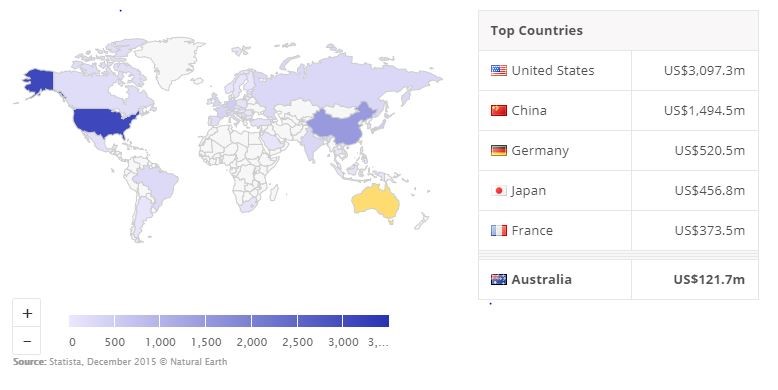
Fig 1: Top Countries in Telemedicine Revenue
According to this figure the top revenue generating country in the field of telemedicine is US with an annual revenue of 3,097.3 million per annum. It is then followed by China and Germany. The global telemedicine market has a value of about 17.8 billion in 2014 it is expected to grow to about 18.4% in 2020. About 90% doctors have started executing telemedicine program, according to a survey conducted among the healthcare executives on the implementation of telemedicine nearly 84 5 of the population wanted to implement the telemedicine services and in which 32% felt it important and the remaining 52% felt that it is very important for the development of the organization
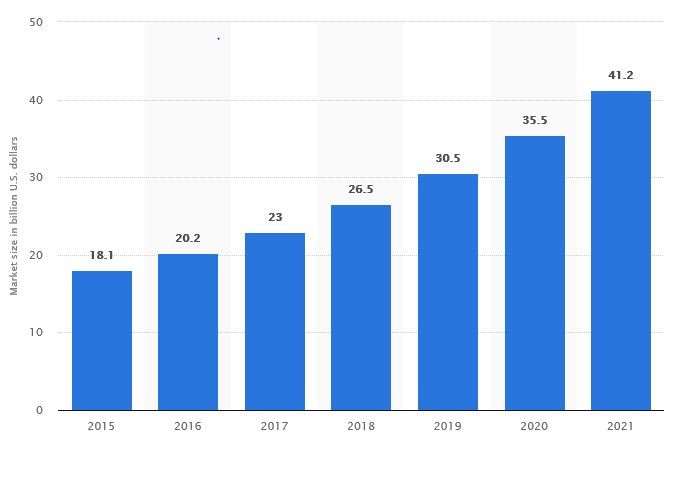
Fig 2: The Increase in market value from 2015 to 2021
This graph represents the increase in the market value in U.S dollar from the year 2015 to 2021. The prediction is that there will be a big jump in market value in the year 2020 - 2021 when compared to 2019 – 2020.
Telemedicine in UK, Middle East and Zimbabwe
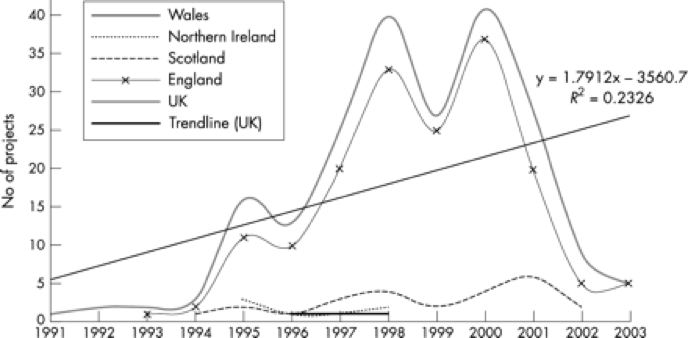
Fig 3: The increase in the number of telemedicine projects in UK
Around 1990 UK really started to embrace the telemedicine development, since then there has been a gradual increase in the telemedicine projects undertaken in UK. Between 2001 and 203 there has been around 216 projects on telemedicine mainly in England. The use of telemedicine varies mainly based on emergency, specialization and projects in the wealth countries of Arabian gulf the incorporation of telemedicine has been a stress reliever from the constrains of chronic diseases such as obesity and diabetes. The UAE leads middle east in to adopting telemedicine. This also allow the other less developed countries to get connected to medical experts around the globe.
Growth based on specialization
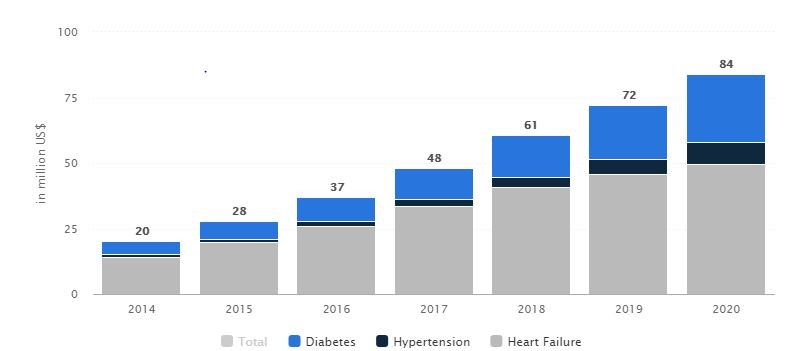
Fig 4: The increase in Telemedicine based on specialization.
This shows the revenue growth and the telemedicine market growth in various specialization. The revenue growth will be rapid in the diabetes specialization in the year 2019 – 2020. It was also found that a total of about $6 Billion can be used by the employers if they implement the telemedicine technology for their employees. Telemedicine also reduces the gap between the patient and the doctor this development is the main reason for the growth in the market value of the telemedicine.
*Source: BCC Research, Transparency Market Research & Markets and Market
http://www.reportsnreports.com/
Abstract Submission Criteria & Eligibility
PRESENTATION REQUIREMENTS:
Authors requested to follow the abstract submission guidelines by downloading abstract template. Presenting authors are responsible for registration, travel, and hotel costs.
Note: Those with accepted abstracts will receive an acceptance mail allowing them to register for the conference.
Abstracts will be compiled and conference books are made available to participants at the conference.
Any presenter who is unable to attend should arrange for another qualified individual to present the paper/poster in question. If such a change is necessary, please notify our conference team.
SUBMISSION OPTIONS:
Oral paper presentations will have 30-minute time slots and be clustered by theme into sessions. The keynote session will have for 45-minute time slot, workshop/ special session will have 60-minute time slot and symposium will have 60-minute time slot followed by 5-minute Q&A session.
Graduate & Masters students are eligible to submit their abstracts under poster and e-poster presentation category.
Ph.D. students are eligible to submit their abstract under special YRF (young researcher’s forum), poster and e-poster presentation category.
NOTE: YRF category includes short oral presentation especially for Ph. D. students
Extended abstract: Submissions should utilize the Abstract Template. Papers submitted in this category may represent original empirical research, theoretical development, reviews, or critiques.
Abstract Submission Deadlines:
Early Bird Abstract Submission: December 20, 2019
Second Line Abstract Submission: January 20, 2020
Final Submission Deadline: April 15, 2020
Conference Highlights
- Advance Telemedicine
- Telehealth and Medicine Today
- Recent development in Digital Health Care Services
- Major challenges in Telenursing
- Recent Advances in Telepharmacy
- TeleCardiology
- Emerging technology on Health System Informatics
- Opportunities in Medical Information Engineering
- Medical Informatics research and services
- Telemedicine Regulation and Terms
- Advancement in Tele-Home Health
- Opportunities in Cancer Informatics
- Recent development in Patient Informatics
- Health Care Technologies
To share your views and research, please click here to register for the Conference.
To Collaborate Scientific Professionals around the World
| Conference Date | September 22-23, 2020 | ||
| Sponsors & Exhibitors |
|
||
| Speaker Opportunity Closed | |||
| Poster Opportunity Closed | Click Here to View | ||
Useful Links
Special Issues
All accepted abstracts will be published in respective Our International Journals.
Abstracts will be provided with Digital Object Identifier by


